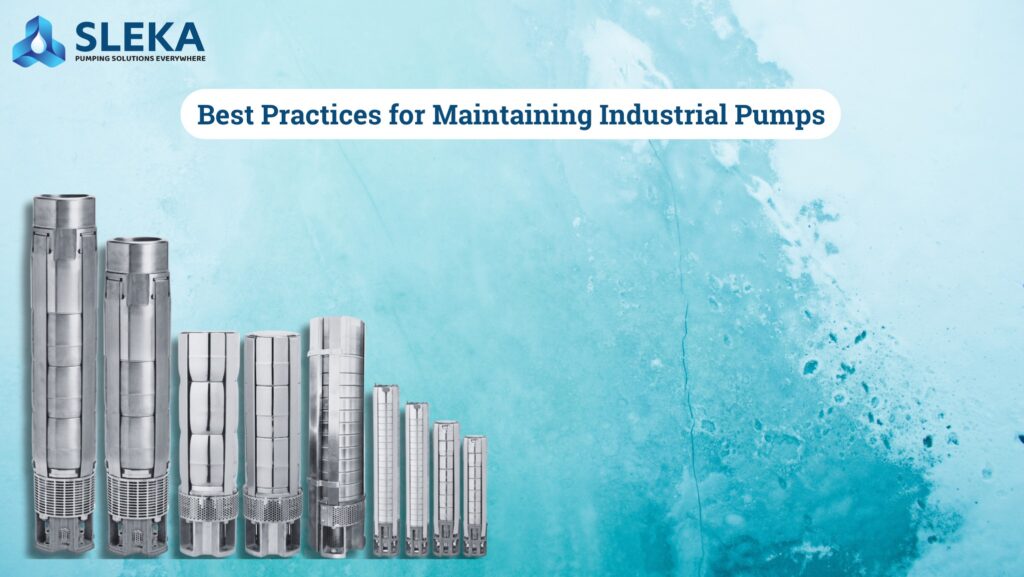10 Essential Tips for Maximizing Your Industrial Pump Maintenance
Industrial pumps play a crucial role in various sectors, including manufacturing, oil and gas, and water treatment. Proper maintenance is essential to ensure their longevity and optimal performance. In this article, we will explore ten essential tips for maximizing your industrial pump maintenance. Additionally, we’ll highlight Sleka’s expertise in submersible pumps, making them a trusted partner for your pumping needs.
Understanding Industrial Pump Maintenance
Industrial pump maintenance encompasses a series of tasks aimed at keeping pumps in excellent working condition. This includes regular inspections, timely repairs, and proper operating practices. Neglecting maintenance can lead to costly downtime and repairs, affecting overall productivity.
1. Regular Inspections
Performing regular inspections is the first step in effective industrial pump maintenance. Check for leaks, unusual noises, and vibrations that may indicate underlying issues. Monitoring the pump’s operational parameters, such as pressure and temperature, can help identify potential problems early.
2. Lubrication
Proper lubrication of moving parts is vital to reduce friction and wear. Use the manufacturer’s recommended lubricants and follow their schedules for lubrication. This practice not only extends the pump’s life but also enhances its efficiency.
3. Cleaning Filters and Strainers
Dirty filters and strainers can restrict flow and increase the workload on the pump. Regularly clean or replace these components to ensure smooth operation. This is especially important for submersible pumps, where debris can easily clog the intake.
4. Monitor Seal Integrity
Seals are crucial for preventing leaks in industrial pumps. Regularly inspect seals for signs of wear or damage. If you notice any leaks, replace the seals promptly to avoid further damage to the pump.
5. Vibration Analysis
Vibration analysis is an advanced maintenance technique that helps identify issues before they lead to failure. By monitoring vibrations, you can detect misalignments, imbalance, or bearing failures early on. This proactive approach can save you significant repair costs down the line.
6. Training Personnel
Investing in training for your maintenance personnel is essential. Well-trained staff can identify issues early and perform necessary maintenance tasks correctly. Ensure they are familiar with the specific requirements of your industrial pumps, including those specialized by Sleka.
7. Document Maintenance Activities
Keeping detailed records of all maintenance activities is crucial for tracking performance over time. Document inspections, repairs, and replacements to establish a history of the pump’s condition. This information can help you make informed decisions regarding future maintenance strategies.
8. Utilize Technology
Incorporating technology into your maintenance practices can enhance efficiency. Use monitoring systems that provide real-time data on pump performance. This information can help you make data-driven decisions and optimize maintenance schedules.
9. Partner with Experts
When it comes to specialized equipment like submersible pumps, partnering with experts is invaluable. Sleka specializes in submersible pumps and offers extensive knowledge and support for maintaining these critical systems. Their expertise ensures that your pumps operate at peak efficiency.
10. Plan for Replacement
Even with diligent maintenance, industrial pumps have a finite lifespan. It’s essential to plan for replacement before a pump fails completely. Consider factors such as operating hours, maintenance history, and performance metrics when deciding when to replace a pump.
The Importance of Sleka in Industrial Pump Maintenance
Sleka stands out in the industry for its specialization in submersible pumps. Their commitment to quality and customer satisfaction makes them an ideal partner for businesses relying on reliable pumping solutions. Whether you need assistance with installation or ongoing maintenance, Sleka provides tailored services to meet your needs.
For more information about Sleka’s products and services, visit Sleka Products.
FAQ Section
FAQ #1: What are the common signs that my industrial pump needs maintenance?
Common signs include unusual noises, vibrations, leaks, changes in pressure or temperature, and reduced performance.
FAQ #2: How often should I perform maintenance on my industrial pump?
It’s recommended to perform maintenance checks at least once every three months, but this can vary based on usage and manufacturer guidelines.
FAQ #3: Can I perform maintenance on my industrial pump myself?
While some tasks can be done by trained personnel, it’s advisable to consult with experts like Sleka for specialized equipment like submersible pumps.
FAQ #4: What should I do if I notice a leak in my pump?
Address leaks immediately by inspecting seals and connections. If you’re unsure how to proceed, contact a professional service provider.
FAQ #5: How does technology improve industrial pump maintenance?
Technology allows for real-time monitoring of pump performance, enabling predictive maintenance and reducing unexpected failures.
Wrapping Up!
This blog shares a lot about “Industrial pump maintenance.” To know more about solar pumps in agriculture, visit Sleka Products.
To know more about Noryl impellers and diffusers, do visit Nobtech Products.
By following these ten essential tips for industrial pump maintenance and leveraging Sleka’s expertise in submersible pumps, you can ensure your pumping systems remain efficient and reliable for years to come. Remember that proactive maintenance is key to preventing costly downtimes and extending the lifespan of your equipment!


